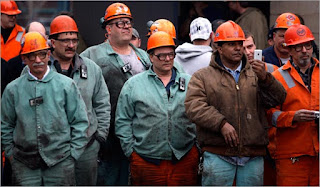
Greenfield shows us the investment
banker who cannot recall the number of homes he owns as he eyes his next yacht;
the Orlando time-share mogul who builds a 90,000-square-foot mansion on credit,
hoping to outrival the Palace of Versailles; the etiquette coach in Beijing who
charges $16,000 to teach proper pronunciation of Western designer labels; the
wife of a Russian oligarch who proudly labels herself “a luxury.”
In addition to the mega-rich,
Greenfield also shows us the poor — primarily white American women, as she’s
chosen to represent them — who are equally caught up in this frantic, often
narcissistic, struggle for excess: the school bus driver who puts herself in
debt and loses her child and home after traveling to Brazil for plastic surgery
(“It was time to focus on me”); the small-town 15-year-old girl who wants to
become a porn star because she is determined to “make something of [her]self”;
the six-year-old beauty queen who chants through pouty, painted lips, “money,
money, money!” while dressed like a Vegas showgirl.
Plenty
By Anne Anlin Cheng
LARB
For a number of years now, I have
been conducting research on forms of employment seen as utterly pointless by
those who perform them. The proportion of these jobs is startlingly high.
Surveys in Britain and Holland reveal that 37 to 40 percent of all workers
there are convinced that their jobs make no meaningful contribution to the
world. And there seems every reason to believe that numbers in other wealthy
countries are much the same. There would appear to be whole industries —
telemarketing, corporate law, financial or management consulting, lobbying — in
which almost everyone involved finds the enterprise a waste of time, and
believes that if their jobs disappeared it would either make no difference or
make the world a better place.
Uwe Mauch has called Vienna “home”
for more than 30 years. The 52-year-old Austrian journalist and writer lives in
a subsidized apartment in the north of the European city, in one of the many
low-cost housing complexes built around leafy courtyards by the municipal
government.
Mauch pays 300 euros, or the
equivalent of $350, a month in rent for his one-bedroom apartment ― only 10
percent of his income.
“It’s great ― I’m really happy
living here,” he says. “I like all the green space right outside my window.
When people from other countries visit, they can’t believe it’s so nice and
also so cheap.”
With its affordable and attractive
places to live, the Austrian capital is fast becoming the international gold
standard when it comes to public housing, or what Europeans call “social
housing” ― in Vienna’s case, government-subsidized housing rented out by the
municipality or nonprofit housing associations. Unlike America’s public housing
projects, which remain unloved and underfunded, the city’s schemes are
generally held to be at the forefront not only of progressive planning policy
but also of sustainable design.
...
Social housing in Vienna has been
widespread since the 1920s when the post-war municipality, led by the Social
Democrats, began building high-density estates all over the city ― typically
six- to eight-story apartment blocks with communal green spaces. Today, anyone
earning up to $53,225 a year after taxes is eligible to apply for a subsidized
apartment in Vienna in a country where the median gross annual income is about
$31,500.
According to the municipality, 62
percent of Vienna’s citizens currently live in social housing.
 Greenfield shows us the investment
banker who cannot recall the number of homes he owns as he eyes his next yacht;
the Orlando time-share mogul who builds a 90,000-square-foot mansion on credit,
hoping to outrival the Palace of Versailles; the etiquette coach in Beijing who
charges $16,000 to teach proper pronunciation of Western designer labels; the
wife of a Russian oligarch who proudly labels herself “a luxury.”
Greenfield shows us the investment
banker who cannot recall the number of homes he owns as he eyes his next yacht;
the Orlando time-share mogul who builds a 90,000-square-foot mansion on credit,
hoping to outrival the Palace of Versailles; the etiquette coach in Beijing who
charges $16,000 to teach proper pronunciation of Western designer labels; the
wife of a Russian oligarch who proudly labels herself “a luxury.”















